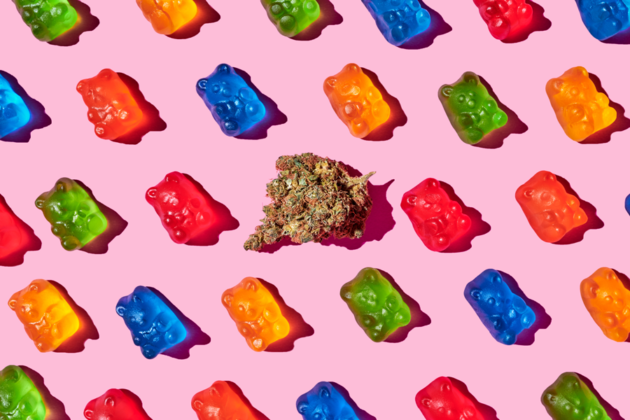
Potential for innovation in cannabis edibles
By Mark Juhasz
Food Trends Specialty Foods cannabis ediblesHow Canadian retailers can diversify and differentiate their businesses
 In 2022, gummies made up nearly 70 per cent of cannabis edibles sales. Photo © goodmanphoto / Adobe Stock
In 2022, gummies made up nearly 70 per cent of cannabis edibles sales. Photo © goodmanphoto / Adobe Stock This October marks the fourth anniversary of legalized cannabis edibles and beverages in Canada, providing an opportunity to gain further perspective on new directions.
From a December 2022 Statistics Canada survey, 70 per cent of the respondents who use cannabis preferred smoking in the past 12 months (down from 74 per cent in 2021), while 53 per cent used edibles, and 19 per cent consumed beverages. Among more regular users (those consuming cannabis in the past 30 days), 29 per cent used edibles, and eight per cent beverages.
Cannabis beverages in Canada have broken through the novelty phase of their development. However, carbonated cannabis beverages saw some growth in the past year. It is THC-infused gummies and chews that sell well and are growing as a category in Canada, especially because of their precise dosing, unique flavour profiles, and discretion in social settings.
Consumer demographics
In recent data collected by Headset on the Canadian cannabis market (tracking only for British Columbia, Alberta, Saskatchewan, and Ontario, or about two-thirds of the population), edibles sales grew nearly 24 per cent between 2022 and 2023, while beverages grew five per cent. In edibles, chews and caramels grew 210 per cent, while candies, lozenges and gums grew 126 per cent.
In 2022, gummies made up nearly 70 per cent of edibles sales. During this same time, there has been a proliferation of edibles brands in Canada, up 74 per cent in 2022.
Older consumers are more drawn to edibles compared to smoking. In the U.S., for example, consumers over 41 years old make up 37 per cent of total cannabis sales, but 51 per cent of edibles sales. Additionally, female consumers make up 37 per cent of total sales, but 46 per cent of edible sales.
Creative and targeted marketing for these consumer demographics, potentially with wellness messaging, could be effective. This is only possible if restrictions on marketing and promotional materials were eased in Canada.

Chefs, food product developers, restaurants, cafes and bars could be allowed to customize dinner and drinking experiences in Canada. Photo © fudio / Adobe Stock
Dosing
A persistent issue with cannabis edibles in Canada remains limits on dosages, which are currently regulated at 10 mg per packaged product. Industry insiders and advocates state some consumers prefer the option of higher THC limits.
Some brands have been able to creatively re-classify their products as concentrates to allow for higher dosage amounts. In the first half of 2023, 20 per cent of edibles sales have been with products containing well over 10 mg per package.
Cannabis lozenges by Edison Cannabis accounted for 87 per cent of their total sales in 2022. Sold as concentrates in 100-mg packs, the Jolt edibles are gaining segment and consumer demand.
Edible dosing in the U.S. is determined at the state level, with some degree of variation. In Michigan, packages can contain up to 200 mg of THC. Most of the states have a maximum of 100 mg. In the U.S., edibles as a total of cannabis sales in 2022 were just under 12 per cent, compared to roughly six per cent in Canada. Canadian industry advocates, such as the Edibles Caucus, and companies like Indiva, have spoken about the consumer segment seeking higher potencies, who remain largely served by legacy markets.
The recently published 2023 Cannabis Act review by the Competition Bureau, submitted to Health Canada, addresses edibles. The review says Canada needs to ease restrictions on dosing quantities, allow packaging to be more customized and attractive to draw more consumers away from the illegal market, and especially for smaller, craft edibles brands, address excise duties, and licensing costs associated with compliance for edibles to compete with the legacy market.
Enhances bites and sips
A creative direction for cannabis edibles and beverages could also be found in marketing and product offerings. Chefs, food product developers, restaurants, cafes and bars could eventually be allowed to customize dinner and drinking experiences, utilizing the diversity of cannabinoids and terpenes found in the cannabis plant. In the U.S., cannabis brands are working with food brands for mutual promotion.
Fatburger (a restaurant chain) is partnering with Kiva Confections (a producer of cannabis edibles) to roll out cannabis-infused ketchup for a limited time. The condiment contains 10 mg of THC and is available at partnering cannabis stores in the Los Angeles area. Wings Over (another restaurant chain) offers CBD-infused garlic parmesan on potatoes, wings and chicken tenders, and customers can add CBD oils.
In the beverage world, the movement toward no or low amounts of alcohol is gaining reception, especially with millennials and Gen Z. Cannabis-infused ‘mocktails’ could be served at bars.
As of mid-2023, a state bill in California is seeking to formally allow for cannabis cafes, which has existed in various forms in the Netherlands for decades. In Los Angeles, Calif., ‘the Original Cannabis Cafe’ brands itself as one of the first-of-its-kind in the U.S., and where, for an extra cost, patrons can opt to add 25 mg of THC or CBD to any dish. Nevada and Illinois legalized cannabis consumption lounges in 2021.
In Canada, cannabis retailers could also partner to develop cafes, thereby diversifying and differentiating their businesses. Ontario began to look at the viability of opening consumption lounges through a public consultation process in 2020. Among Canadian cannabis users, there is interest and demand to consume at licensed and regulated establishments, whether at an outdoor cafe, restaurant or even a retreat centre.
At the Bend Cafe and Lounge (adjacent to a cannabis store), in Grand Bend, Ont., the owners provide customers and the local community an area to safely consume cannabis, with experienced staff helping to explain products. Representatives from the Ontario Cannabis Store reviewed the cafe and did not raise any concerns.
Initiatives such as this, or the Farm Gate program in Ontario (and other provinces), which offer customized experiences for local cannabis purchasing at the source, are part of the process of helping to intelligently, and safely, grow the cannabis edibles and beverages category.
Mark Juhasz is CEO and founder of Harvest Insights. He has more than 20 years of experience in the agri-food industry. He can be reached at www.harvestinsights.com.
This article was originally published in the August/September 2023 issue of Food in Canada.
Print this page